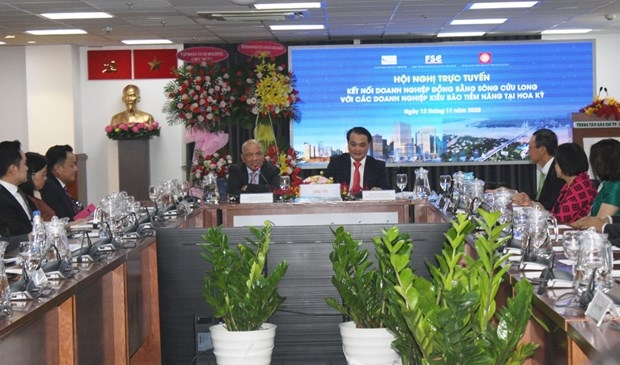Overseas Vietnamese entrepreneurs helpful in promoting exports to US: teleconference
Capitalising on the network of Vietnamese entrepreneurs in the US is among effective ways to promote the export of Vietnamese goods, including agricultural products, to this major market, heard a teleconference on November 12.
The event, matching businesses in the Mekong Delta with expatriate entrepreneurs in the US, was held by the Department of External Relations of Ho Chi Minh City, the Business Association of Overseas Vietnamese, and the Vietnamese Entrepreneurs Network in the US.
Vietnamese Ambassador to the US Ha Kim Ngoc said trade between the two countries is growing dynamically, creating numerous cooperation chances for their businesses. Bilateral trade has approximated US$80 billion each year, and both sides have become important trade partners of each other.
Connecting businesses in the Mekong Delta with Vietnamese firms in the US will help tap into both sides’ advantages, he said, elaborating that the Mekong Delta is the largest rice production, aquaculture and fruit farming centre of Vietnam, and many of its localities are also taking the lead in producing consumer goods and hi-tech products, helping to turn this region into one of the biggest sources of exports in the country.
Meanwhile, the US is a large and potential market with increasing demand for Vietnamese goods. The Vietnamese community here numbers more than 2 million and owns over 300,000 business establishments across the US.
Many of Vietnamese enterprises in the US are specialised in distributing goods among the community, becoming a bridge for Vietnamese goods to enter this market and helping to form a cooperation network of overseas and domestic companies, according to Ngoc.
Nguyen Hoanh Nam, Vice Chairman of the State Commission on Overseas Vietnamese, said Vietnamese people in the US now account for nearly half of the total number of overseas Vietnamese, and they are assessed as a dynamic community with strong economic capacity.
In recent years, businesses of Vietnamese entrepreneurs in the US have paid more attention to the Mekong Delta, he said, adding that connecting the two sides will help make use of the expatriates to promote exports and raise the stature of Vietnamese goods in global markets.
Expatriate entrepreneurs in the US shared the view that there remains huge potential for the export of Vietnamese goods, including the Mekong Delta’s typical products like fruits, farm produce and aquatic products, to serve not only the Vietnamese community there but also local consumers.
However, they admitted, trade has yet to match potential and demand due to various reasons, including transportation and quality of goods.
Amy Nguyen, an importer and distributor of Vietnamese fruits in the US, said to sustainably boost exports to this market, Vietnamese producers need to control quality in all steps, from farming, purchasing, processing, packaging, and preservation to distribution.
Other businesspersons suggested a centre be built to control the quality of all Vietnamese products exported to the US so as to ensure that they meet the importing country’s standards and minimise cases that may affect bilateral trade.
Bui Huy Son, Minister Counsellor in charge of Vietnam’s trade office in the US, recommended that to access this market, businesses should update themselves on its demand, learn about quality and technical requirements, form production connectivity, and cut down costs to promote competitiveness.
They should also have good storage and governance of products’ information to prevent risks, he added.

